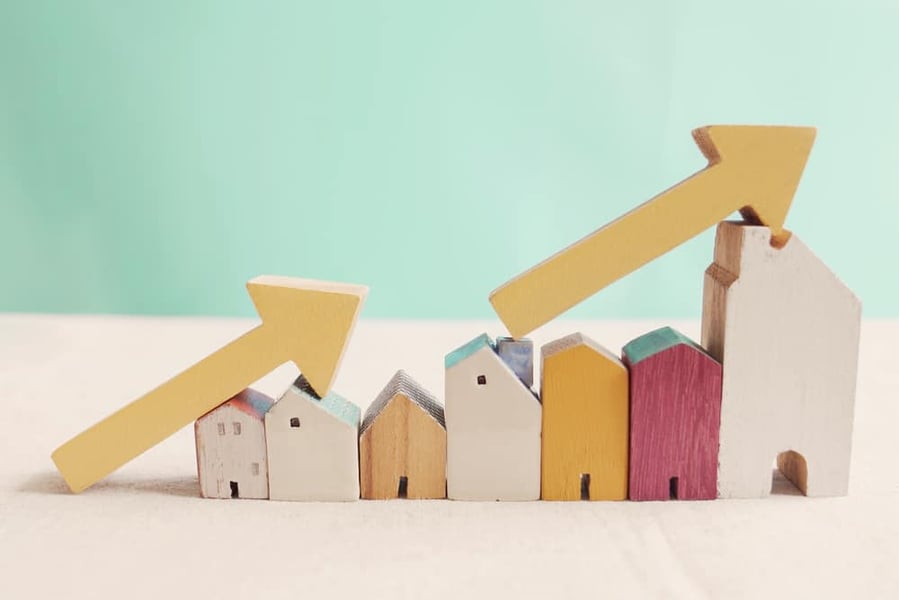The average UK house price was £264,000 in August 2021, £25,000 higher than the same time last year.

UK average house prices increased by 10.6% over the year to August 2021, up from 8.5% in July, according to the latest Office for National Statistics (ONS) UK House Price Index.
The average UK house price was £264,000 in August 2021, £25,000 higher than the same time last year.
Average house prices increased over the year in England to £281,000 (9.8%), in Wales to £195,000 (12.5%), in Scotland to £181,000 (16.9%) and in Northern Ireland to £153,000 (9.0%).
London continued to be the region with the lowest annual growth (7.5%) for the ninth consecutive month.
Rob Barnard, director of intermediaries at Masthaven Bank, said: “The continued ‘race for space’ created by the pandemic has continued to drive up house prices, with the tapering of stamp duty relief over the past year hardly slowing momentum down.
"While booming levels of buyer activity are certainly encouraging, it is difficult to know if they will last.
"The end of the government support schemes, as well as expected tax hikes in the new year, could serve to weaken demand going forward.
“Indeed, the country’s economic outlook over the coming winter looks uncertain, from rising inflation to extensive supply chain issues.
"Amid this backdrop, borrowers will require the guidance of specialist lenders now more than ever to ensure they can get on the housing ladder.
"Prospective buyers struggling to buy a home, or those who have seen their financial circumstances take a knock over the past 18 months, will need the advice and personalised products which specialist lenders can provide.
"It will be vital that specialist lenders continue to innovate and develop tailored products and collaborate with brokers to understand the unique and shifting needs of customers.”
Kevin Roberts, director at Legal & General Mortgage Club, added: “Structural factors have continued to drive unprecedented levels of buyer activity, from the enduring ‘race for space’ amid remote working, to the very affordable mortgage rates that are available to borrowers today.
“However, it is also possible that this uptick stems from the return of international buyers.
"In fact, our SmartrCriteria tool revealed that searches made on behalf of international buyers grew by 160% in August.
"Naturally, this coincided with the easing of international travel restrictions and the slowing of domestic purchase activity as the Stamp Duty holiday drew to a close.
“Whether such levels of demand will persist through Q4, however, is uncertain and seeking the guidance of an experienced adviser will be key as we face into the next few months.
"Independent mortgage advisers are well-placed to offer bespoke recommendations and inform borrowers of the best deals to help turn this corner.”
Anna Clare Harper, chief executive of SPI Capital, said: "The temporary stamp duty reduction, alongside billions of pounds worth of loans and grants, was designed to protect consumer and investor confidence through the pandemic.
"Combined with lockdown-led upsizing, low interest rates making finance cheap, and competition amongst lenders, this has added to housing demand and a price boom, whilst supply is restricted.
"The trouble is, rising house prices are in direct conflict with other government objectives.
"More expensive housing makes homeowners feel confident, which is great for the economy, but also makes housing less affordable and less accessible.
"This is a recipe for social disaster, since it comes at a time when many landlords are giving up due to the burden of laws and regulations affecting properties and their management.
"The housing market has the potential to solve many social, economic, and indeed political problems.
"However, it also has the potential to increase divides in society.
"Perhaps the most obvious are geographical and age divisions. Firstly, there’s the ‘North-South’ divide, to be tackled by ‘levelling up’.
"Secondly, there’s the widening gap between older and younger generations, which is most likely to be tackled through tax.
"In terms of what next, the housing market will continue to be vital to our economy, and also vital to the achievement of wider government policy.
"It’s hard to see a future without tax reform of some kind to level the playing fields between the older ‘haves’ and younger ‘have-nots’."



